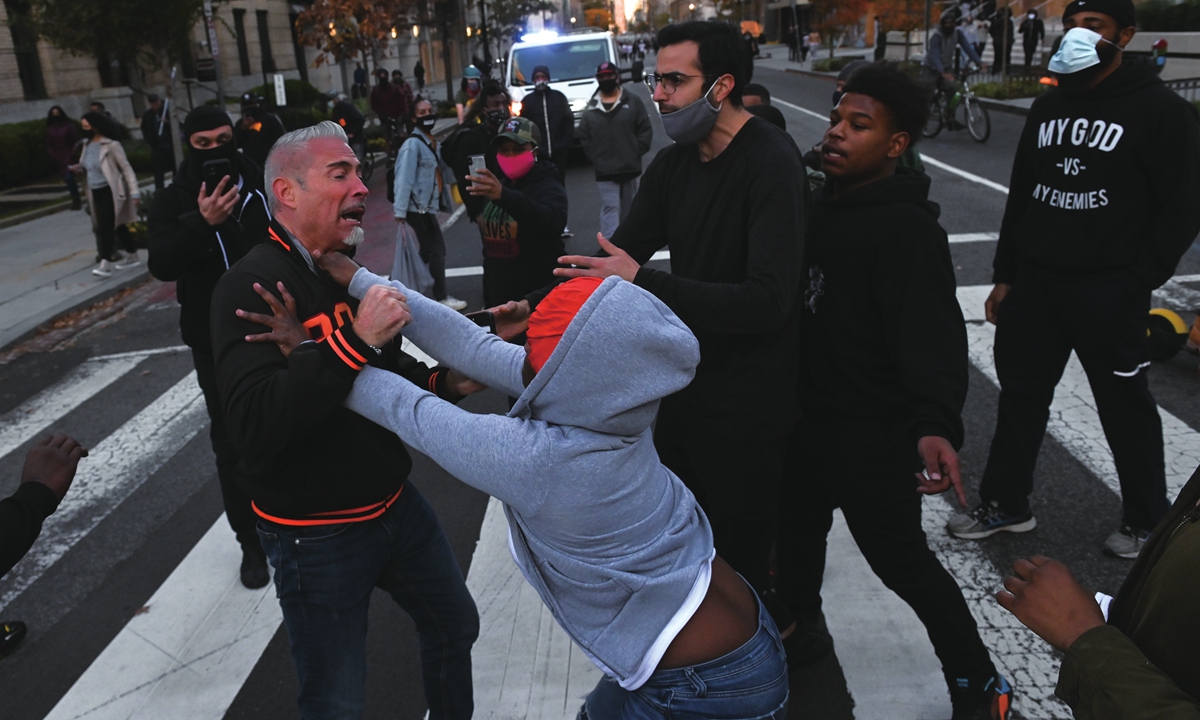US has lost its moral superiority amid raging post-election chaos
By Lu Yuanzhi Source: Global Times Published: 2020/11/15 20:28:09

A supporter of US President Donald Trump (left) is attacked by anti-Trump demonstrators in Black Lives Matter Plaza in Washington DC on Saturday. Photo: AFP
Thousands of US President Donald Trump's supporters on Saturday rallied in Washington DC to protest the result of the US presidential election. Smaller groups of counterdemonstrators gathered in downtown area in support of Joe Biden's electoral victory. Violent skirmishes between anti-Trump protesters and pro-Trump demonstrators took place throughout Saturday evening, according to US media reports.
Washington considers itself the beacon of world democracy and freedom. After the election, Trump and his supporters have refused to recognize the election result on grounds of illegal voting, of which voting supervision officials declared there is no evidence. Violence broke out when the two groups rallied on the street. Prior to the election, it was hard to imagine that this kind of post-election pandemonium, usually seen only in countries where the democratic systems are underdeveloped, could occur in the US - the world's most powerful country.
Xin Qiang, deputy director of the Center for US Studies at Fudan University, told the Global Times on Sunday that the post-election chaos partly results from the current state of US society, where the polarization and social divisions have become grave. Supporters of the two parties seem reluctant to make compromises. On top of this, Trump is not the type of person to willingly admit defeat, and so far, his administration has not respected the rules and regulations to facilitate a peaceful transfer of power.
Although the US is still the strongest country in terms of economy, military and technology, its social divisions and bipartisan battles have undermined the US' soft power. As the post-election chaos drags on, the US can no longer proclaim its election process is superior to those of other countries. The US' ability to guide global democratic elections is declining.
Thousands of supporters rallying to bolster Trump reflects the deep influence he and his base have exerted on US politics over the past four years. The Republican Party and its base are in thrall to Trump. His ideology will have a profound impact on his party and will continue to shape the GOP's future. Democrats must do some soul searching on why Trump has such a large following. In a bid to win the support of more voters, it cannot be ruled out that some Democrats would follow Trump's example.
The US has always been keen on fanning the flames of demonstrations in other countries. For example, US Secretary of State Mike Pompeo said in August that the presidential election in Belarus was "not free and fair," and strongly condemned "ongoing violence against protesters and the detention of opposition supporters." However, it was reported on Saturday that at least 20 pro-Trump and anti-Trump protesters were arrested in the clash in Washington. This comes as another example of the US' double standards.
Most countries believe that the US has no right to interfere in other countries' internal affairs. When Washington is not satisfied with the outcomes of elections in others countries, it imposes sanctions to exert political pressure. These moves from the US are firmly opposed by the international community. Xin said that the US' meddling with other countries' internal affairs is partly motivated by the ideological confrontation with some countries, but comes more from a consideration of the US' own interests.
Even though the US post-election chaos has drawn global attention, the rest of the world is looking on from a ringside seat, watching and waiting to see how and if the US climbs out of the mayhem. They are not interfering in the US' internal affairs as the US has done with other countries. Many countries and regions have suffered a lot from the US' hegemonic meddling. Sovereign equality and noninterference in the domestic affairs of other countries is the widely recognized norm of international relations. Due to the divergence in cultural traditions and history, every country has its own way to tackle its problems, and other countries have no right to tamper with them.
Posted in: OBSERVER